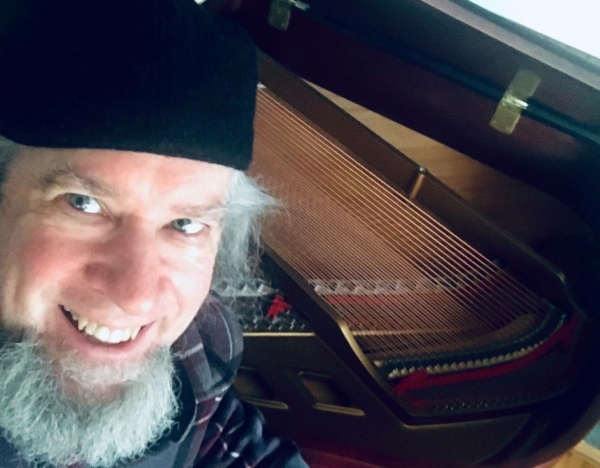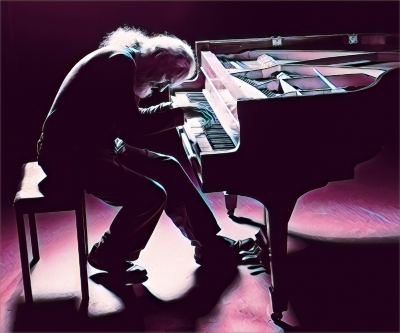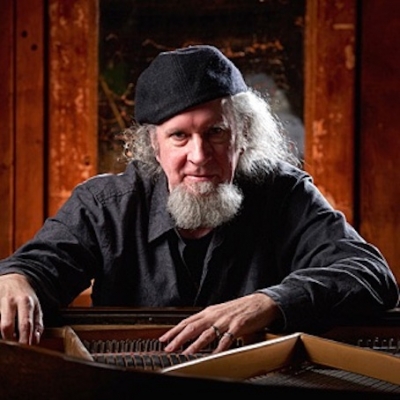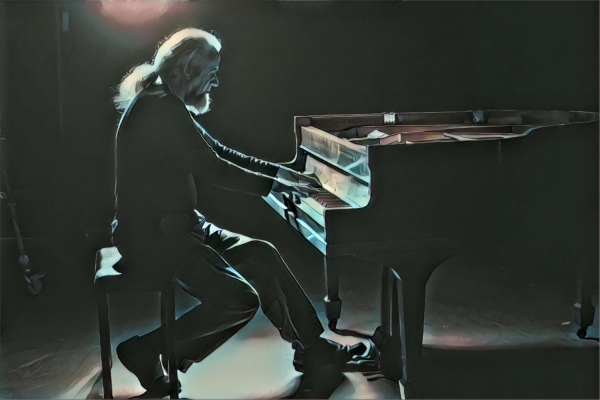I first came across Tobin Mueller’s music when I reviewed his debut album,
Morning Whispers, in 2005. Even then, I was very impressed with his versatility and command of a variety of music genres, but little did I know that it was just the tip of the proverbial iceberg. A composer, playwright and interpretive pianist living in Connecticut, Tobin's works include musical theatre, film scores, ballets, symphonies, video game soundtracks and children's music. He has written lyrics, stage plays, fiction, political essays, poetry, philosophy, domestic humor, video games, music and keyboard reviews. He's sold his photographs to the hotel industry and his digital illustrations as part of his web design work, but he has always thought of himself as a composer, first and foremost. A true 21st century Renaissance man, Tobin has quite a story to tell in this interview! We also did an
interview in 2009 that tells more about his early life.
KP: Hi Tobin! I just read through the interview we did in the fall of 2009. We covered a lot of territory in that interview and I think it made it clear what a multi-faceted artist you have always been and continue to be. At that point, you had released five albums that I reviewed; now there are nineteen, several of which are two-disc sets, and I have no doubt that you have plenty more up your sleeve. You are actually the sixth most-reviewed artist on MainlyPiano.com out of the 929 artists that are currently on the site. What kinds of projects are you working on now?
TM: First, let me say what a marvelous job you do covering and promoting new music. I speak for hundreds (if not thousands) of musicians when I extend my deepest thanks. That you focus on piano works is a special bonus. Much appreciated!
KP: Thanks so much for that, Tobin!
TM: As to what I’m working on… The popularity of my 2018 jazz album Standard Deviations has resulted in me being involved in licensing efforts regarding older works in my music catalogue. This got me looking at past film scores and previously unreleased instrumental experiments. I am currently collecting the best of them. I have begun editing, remastering, and organizing them into what will be my next album. Most fall into the progressive rock/electronica genre. I’ve titled it Wonder in honor of my 2-year-old granddaughter who loves progressive rock music! She will be on the cover. (What better illustration of “wonder” than a 2-year-old’s wide eyes!)
KP: Really!
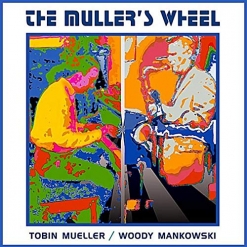
Click on album covers to go to Kathy's reviews.
TM: It is a bit different than the jazz and acoustic piano focus of my last few releases, but will actually follow nicely on the heels of the success Standard Deviations has had with the college radio scene. (It reached #16 on the independent radio charts, which includes independent rock and more popular genres.)
KP: I’m looking forward to it!
Over the past several years, you have been dealing with serious health issues that resulted from your working at Ground Zero during the 9/11 crisis in New York. Tell us a bit about that.
TM: Nine years ago my lung doctor gave me 8-12 years to live. He’s retired now and I’m still kicking, so we’ve rejiggered my expiration date! My exposure to the air toxins after 9/11 exacerbated what I thought was mere asthma, but it turned out to be a speeding up of a deeper genetic disorder, A1AD. What doctors thought was a condition that could only get worse with time has been held in check, on most fronts, with new drugs, diet and life-style changes. So, even though I have many physical limitations, I’m still able to spend several hours a day playing piano, most days. If I can avoid stress - one of my main negative triggers - I do pretty well. One of the things I discovered through years of trial and error, was how stressful live performance is. At first I stopped performing because I was simply coughing all the time. But then I realized how even the demands of memorizing something intensely can cause exhaustion and swelling and intestinal upset. Stress is not just nerves, but the whole focused mind-body exertion of learning/memorizing/perfecting. So I’ve learned to do one piece at a time, spread out recording sessions with plenty of down time between, and to shorten everything. I pretend I’m more efficient and get just as much done, but the truth is I don’t mind taking longer to complete a project. More time to enjoy, cherish, savor.
KP: That’s a pretty amazing story! I’m so glad the doctors were wrong about your early demise and that your health has been improving!
We should talk about some of the projects you’ve worked on the past ten years - they have all been so different from each other. An obvious place to start would the September 11 Project that you released in 2011 to commemorate the 10-year anniversary of that terrible day and the aftermath. Was it healing for you to create that music?
TM: Almost all of the music included in the September 11 Project was written in the 4 months following 9/11. The sole purpose was healing. I was barely able to close my eyes after 9/11, let alone write anything. I volunteered with the restless energy of desperation, trying to fill a hole inside myself (and in the City itself). Since the Twin Towers used to stand squarely in the center of my Manhattan bedroom window, I couldn’t even look out a window and not feel loss and lost. I wrote those pieces because it was all I could think about and knew if I didn’t write about 9/11 and its aftermath, I wouldn’t be able to write about anything. It was total self-therapy.
KP: I just really can’t imagine how awful that was. What made you decide to release the album ten years later?
TM: I was asked to be in a 4-hour television roundtable discussion with some of the main people involved in the events of that day. It was a panel of a dozen officials from the NYC fire department, the World Trade Center security team, the harbor police, the canine search and rescue divisions… I was the only person there not in uniform. You see, I had headed up the volunteer effort to supply people at Ground Zero, transforming Chelsea Piers into a drop off and distribution center for everything from boots to buckets, food to antibiotics, ventilation masks to cigarettes. We were totally ad hoc and eventually shut down by FEMA because of it, but were loved by the people at Ground Zero who were doing the dangerous work. They dubbed us “The Home Depot.” It was wonderful meeting the people I was helping. None of the roundtable officials knew who I was until I told my story. They all got up and we hugged each other. Really a great moment. So I burned a CD for many of them in appreciation, and then decided “Why not put out a digital release of the music for everyone to hear?” It was my first digital-only release. Combined with the ten-year anniversary commemorations, releasing the songs ended up being a wonderful way of putting it all behind me. It helped to close the book on the tragedy, the utopian aftermath, the long wait for rebuilding to occur, and the eventual getting back to normal. So, even the final step, putting the album out 10 years later, ended up being a healing thing.
KP: I’m sure it was very healing to many people, but I’m especially glad it gave you closure.
You released
The Muller’s Wheel that same year as a download only and re-released it in 2012 as a remastered CD. Why did you remaster / re-release it?
TM: As it turns out, the radio industry still requires physical CDs, mainly. And the CD case needs to have a legible binder on it, or else they might throw it away unopened. Plus, I got early feedback that the sax was too loud in the mix on several tracks. (I had taken the advice on saxophone levels from my sax player…! Always a mistake :-) So, I remastered the tracks and also cut two tracks that didn’t seem in sync with the other tunes. I like the 2012 CD remastered version better (available only on CD, by the way; the download is still the earlier mix).
KP: The Muller’s Wheel was a collection of original music that paid tribute to your and sax player Woody Mankowski’s major jazz influences. You’ve done quite a few collaborative albums. How do you choose other musicians to collaborate with or do the projects just kind of fall into place?
TM: Well, anyone who doesn’t snap up the chance to collaborate with Woody Mankowski is crazy. He’s not only an astoundingly talented and versatile saxophonist, his style choices mesh perfectly with my arrangements, even when he comes up with something I never expected. Maybe, especially then! I met him in the late 1980s. He was singing like Ray Charles with the Green Bay Packer Big Band at Lambeau Field and I went up to him during half-time and gave him my card. After he played soprano and alto sax on my Rain Bather sessions (recorded at Lawrence University), he became my go-to sax player. I also collaborated with Donny McCaslin, who lives closer (Brooklyn), but after he won a Grammy working on David Bowie’s final album, he has gotten a lot busier. Ha! (Donny played on A Bit of Light, 2007) My most famous collaborator, Ron Carter (Come In Funky 2014), was an unplanned fluke - just a short recording experiment that resulted in a handful of unusual jazz duet etudes. It wasn’t until my third son, Carl, heard them on my computer when visiting one day and said "These need to see the light of day," that I decided to release them. I brought a bunch of tracks into the studio and Come In Funky was born.
Most of my collaborations from the 2000’s came from my involvement in promoting Internet-based music collaborations. I worked with some great musicians from all around the globe who were mutually dedicated to making the Internet into a world-wide studio. My more recent collaborators, however, are closer to home, coming from the studio I work with, Factory Underground. That is how I hooked up with the fabulous players that appear on Standard Deviations, especially Grammy winning guitarist Paul Nelson. It helps when someone like Kenny Cash produces your album. I don’t really get out much anymore to meet new people.
KP: Interesting! Song of Myself (2012) is a collection of cover songs and an original track that you said in the liner notes you would like to be able to play at your own funeral. How did you choose those songs and would you choose the same ones seven years later?
TM: Like almost everything else in my life, if I had to do it over again I would do it completely differently. I think a new list would include something by Billy Joel (“And So It Goes”), “Smile” by Charlie Chaplin, and more standards like “The Very Thought of You” and “What A Wonderful World.” Plus a few lesser known tunes like “Look To The Rainbow” (from Finian’s Rainbow), “I Carry Your Heart” (by David Crosby based on the E.E. Cummings’ poem that we read at our wedding), and “Feels Like Home” by Randy Newman. 2012 was supposed to be my last good year, health-wise. My lungs were essentially decomposing and my ability to sing was rapidly slipping away. So songs like “Frozen Man,” which I sang with a deeply authentic pneumonia cough, seemed more than apropos at the time. The original concept of Song of Myself was to preserve some of the songs I played and sang for my wife after dinner. But I also wanted to pay homage to some of my influences, like Joni Mitchell and Stephen Sondheim. It’s hard for me to whittle down song lists when I plan a project. It’s one of the reasons my last five CDs have been double albums!
KP: I don’t think I’ve ever heard a fan of any artist complain about a double album!
Hard Place to Find (2013) is a continuation of sorts of Song of Myself with a stronger voice. Have your voice and lungs continued to heal?
TM: Yes, defying the experts. Although better than feared, my voice isn’t that strong. 2013 was my upsurge year. I would never record my singing nowadays. Not quite strong enough to hold pitch anymore. I recorded
Song of Myself in my home studio, but
Hard Place to Find was a Factory Underground studio recording, so a few bells and whistles helped my vocals sound better than they are in real life. The bottom of my lungs no longer look like they were gnawed at by dogs, however, the A1AD honeycombing is still there and my lungs are still covered in blisters ready to burst. I haven’t had a collapsed lung since 2014 (during a rehearsal for a concert… the last time I will attempt that.)
KP: What a story! You also released a solo piano Christmas album, Midwinter Born, in 2013. Are the arrangements on that album ones that have evolved over the years, or did you arrange the songs specifically for that album?
TM: I arranged them specifically for that album. It was fun, since I worked on them during the hot summer months. In air conditioning. Playing Christmas music out of season brings its own kind of magic. It’s funny, although I’ve received many compliments on that album, it’s the one I wish I could do over again. There are so many different directions I considered going with these classic carols. I think I would go more standard jazz now as opposed to the Neo-classical route I took on many of the arrangements. The album has some very pretty moments, an homage to the spirit of Christmas, which is nice and soothing. Nothing wrong with soothing, I guess, but I’d go with something hipper if I’d do it over again. Still, lots of my listeners pull it out every year as one of their go-to holiday soundtracks. I appreciate that.
KP: It’s a really nice album that puts a new spin on some old and often-overdone carols. You could always do a second Christmas album!
TM: Thank you. I picked the most ancient carols, mostly French and old English. It was interesting researching the origins of songs that everyone recognizes yet were composed mostly by unknowns. I dedicated the album to all the unknown composers out there.
KP: Come In Funky (2014) went in a totally different direction and was another collaborative album. Where did that one come from?
TM: Come In Funky alternates between Big Band / Old-school Funk and the intimate jazz etudes I did with bass legend Ron Carter. Almost all of the Big Band pieces are tracks recorded in previous sessions that didn’t make the album they were intended for because they were too Funk and not enough Jazz. As I mentioned before, Come In Funky would never have come about if my son Carl hadn’t rediscovered the music on my studio computer and told me “This is way better than the stuff you’ve been putting out lately” or some left-handed compliment like that. It has turned into one of my most-played albums.
KP: Your next three albums are your interpretations and arrangements of the music of the Impressionist composers of the late 19th and early 20th centuries (Impressions of Water and Light), and the music of JS Bach (Flow) and Chopin (Of Two Minds). The latter two are both double-albums and all three include extensive booklets explaining the origins of the interpretations as well as a lot of information about the music and composers. Are there going to be any sequels or additional volumes to that series?
TM: I view Standard Deviations (2018) as a kind of extension of that series, in that I re-imagine the great Jazz Standards of the 20th Century. Including composers like George Gershwin, Hoagy Carmichael, Duke Ellington, and Harold Arlen in a direct lineage with Bach, Chopin and Debussy works for me.
I was planning on doing a Beethoven album. I had even played through his catalogue and picked what I was going to reinterpret. But most of what I chose was too physically demanding in its sustained anger (if I can use that term in this context). I just couldn’t imagine spending a year wearing myself out like that. The Bach album took me three months to recover from, physically. It’s one of the reasons I picked the Gershwin/Ellington/Carmichael route afterwards. Also, I’ve marketed the Bach-Chopin-Debussy collection as the Masterworks Trilogy. If I add another masterwork, I’d have to rename the collection :-)
KP: Very true! And I agree with you that "masterworks" can be from any era and any style of music.
2016 saw the release of If I Could Live Long Enough, a compilation of twelve of your favorite songs that never made it onto albums, including some of the songs from your musicals. Do you plan to add another volume to that collection?
TM: No. But I did add six BONUS TRACKS to the collection after it was released. They are available on my website. I should’ve included them in the album, but just didn’t think another double album was a good idea. However, once I complete the next few projects I have planned, I am coming out with an 8-CD Box Set, The Best of Tobin Mueller. This will have previously unreleased composer drafts of some of my favorite songs I wrote for my Off Broadway shows, and even my favorite songs written for children in my CenterStage days back in the 1980s. I guess you could consider that another volume?
KP: I’ll be looking forward to that set! Do you plan to have all of the music from your musicals recorded at some point?
TM: No. But I have all the old scores safely boxed up in my basement if someone else ever wants to!
KP: In 2018, you released Afterwords, a collection of favorite spoken-word quotes and passages from favorite novels, short stories and poems paired with your original piano solos. A second disc features some of the same music without the words. This album is so honest and moving that I gave it my “highest recommendation.” How did that album come about and how long did you collect the quotes?
TM: Afterwords is my favorite album, even though it is probably the one with the least amount of radio play. (Listening to some old guy talk while playing solo piano is not in great demand, it seems.) I'm extremely proud of those piano compositions. In a way, the album was an addendum to my
Masterworks Trilogy. I had a desire to pay homage to the
non-music authors who’ve inspired me through the years, like I did to my favorite composers. Plus, I had a bunch of pent up compositions I wanted to record after spending three years working on other peoples’ music. How do you pick your favorite books, let alone the most illuminating quotation from each, when you've been an avid reader your entire life? It took me three months to compile a list of authors, identify their most important books (using entirely personal criteria), reread sections and choose the quotations, then rank them to discover which ones would make the cut. I ended up combining a few authors, so even though the album has 17 tracks, I quote 21 authors. I figure another 30 fell to the wayside. I considered doing a follow up album dedicated to playwrights, since I had so many quotes from plays that I didn't use. If
Afterwords would’ve sold better, I might’ve done it. The album won several awards but just didn’t catch on like I’d hoped. Thanks for your “highest recommendation,” by the way. I’m so glad you embraced the intellectual/emotional concept. I loved that you called my music “honest.” A thrilling and unique compliment.
KP: You’re very welcome. Sincere honesty is something I’ve always felt about your music. And thank YOU for that!
Last year’s Standard Deviations is a 2-disc collection that pays homage to thirty-three of the great jazz standards of the 20th century. I thought it was interesting that the first disc is more up-tempo and is dedicated to your father. The quieter disc 2 is dedicated to your mother. What gave you the idea to do that?
TM: Again, I had too many ideas to fit on a single disc, so I needed a way to organize the tracks. My original idea was to separate them into “Night” and “Day” since the Cole Porter tune “Night and Day” was one of the songs I was going to cover. When I decided to drop “Night and Day,” I needed a new reason to group the songs into upbeat (Day) and mellow (Night). That’s when it hit me: Nearly all the tunes on the “Day” disc were versions of the small combo pieces my father preferred and most of the “Night” songs were ballads my mother liked to sing. Since my love of jazz standards obviously comes from my parents, it seemed only fitting to acknowledge them by dedicating the different discs to each. They were very different people, but in combination were outstanding parental influences. Standard Deviations would definitely be their favorite album I’ve ever done.
KP: Okay, my friend, what’s next?
TM: Just like after Masterworks Trilogy, I have a bunch of pent up compositions after working on arranging other people’s music for a year. I am currently writing music for an upcoming solo piano release: Instead of Heaven. As I record draft versions of each piece, I’m posting them on my website to get feedback. Also, I will be going into the studio in early summer to edit, overdub and remaster a collection of progressive electronica and film score music (Wonder). After that, we’ll see. Standard Deviations was such a success, I may do a similar ensemble album re-arranging jazz versions of Beatles music. That would be a nice feel-good project to spend extended time on. My interpretation of “Eleanor Rigby” on Standard Deviations is one of its most popular tracks. Funky versions of “Come Together” and “Can’t Buy Me Love” are already whispering in my ear… I just have to pace myself. Believe me, there’s no hurry.
KP: What a fascinating and inspiring story, Tobin! Thanks for spending some time with us! I hope your health continues to improve and the music continues to flow!
Many thanks to Tobin Mueller for taking the time to chat! For more information about Tobin and his music, be sure to visit
his website and his
Artist Page here on MainlyPiano.com. Reviews of all of his recorded music are available on this site along with the interview we did back in 2009.
Kathy Parsons
February 2019

